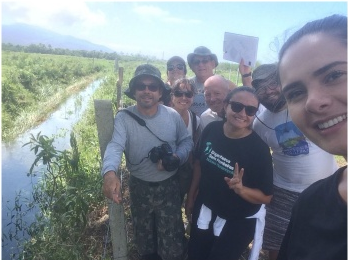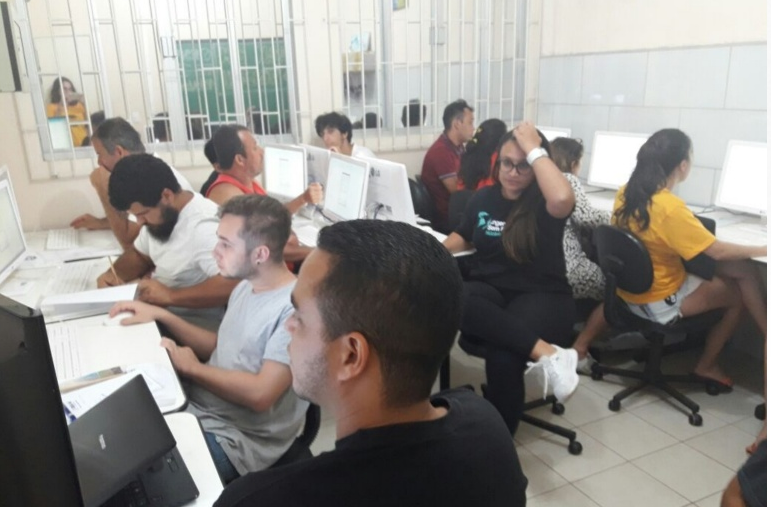Summer School: Empowering the community and improving integrated water management by engineering tools
Description
The Summer School Project is an interinstitutional action that seeks to join efforts with higher education institutions, organizations active in areas of interest to the project, community leaderships, municipalities and with the population, in order to contribute to local sustainable development and the construction and promotion of citizenship through the application of engineering technical knowledge to meet the needs of disadvantaged communities.
The project has as its main objective to empower the ´´Costa de Dentro´´ community giving them possibilities to learn knew subjects and to understand sustainable development. The main goal was to give the opportunity to the youth to learn geoprocessing skills so they could use that as a tool to water management. Although the course was more focused on the geoprocessing theory, after this step the students could apply what they learned on field and the results were really important for the municipality. Our objectives are closely linked to the targets 4.4 and 4.7 relating to increase the numbers of youth with relevant skills and to teach subjects associated to sustainable development. Also, it was related to target 6.b as it was interrelated to water management.
In January 2018, meetings were held between experts and community leaders, which were needed to align the project objective with community demand, defining implementation dates, logistic planning, gathering necessary and available resources, and seeking partnerships and synergies. At the same time, other activities were developed to guide the project, such as: inform the city and local leaders about the Summer School Project, its possibilities and limitations and present the possibilities of actions, within the sanitation axes (water, sanitary sewage, urban drainage and solid waste management), thus complying with the main needs and demands of the community. In addition, the counterparts of the directors and the community were presented, seeking to find resources available and possibilities for collaboration, cooperation and synergy in actions. Subsequently, the community confirmed its interest in joining and participating effectively in the 2018 Summer School project. On January 13, the organizers of the school met in the Coast of Inside, they made a field trip to recognize the target territory of the technical actions that were later visited by the students. The elaboration of the work plan respected the precept of participatory construction with the local community and the participants of the Project. The Summer School schedule provided for a 15-day immersion in the community of Costa de Dentro with activities of integration between the participants and the community, theoretical training and practical actions in the community. In a second moment, we opened a invitation for the participation of the students of the Higher Education Institutions (IES) of Santa Catarina in Summer School Project. The invitations were sent to the Coordinators of the Courses of Environmental and Sanitary Engineering of 13 public and private IES of Santa Catarina, being in the end elected 8 students.
The training in geo-referencing, carried out by the engineers Samuel and Monique, made it possible for engineering students and members of the Costa de Dentro community in Florianópolis-SC to map the paths and springs near their community. The maps obtained allow the indication of the way to maintain the water system. In addition, all activities related to this axis of the Basic Sanitation were accompanied by residents, who are properly trained, can follow the study and georeferencing all their springs and adjacent water courses, characterizing the technical empowerment of citizens to manage natural resources. Definitely, only the domain of technology is not the solution to the crises that we live in the world. The Summer School Project, showed that in the construction of knowledge it is not enough to create a comprehensive, economically viable and efficient technology, since what occurs during the use of science and academic knowledge in the practice of a community is much more than to "engineer". The experience begins with the impetus to transform something, but extraordinarily at the end of the journey the project's own idealizers are transformed. From the dialogue of knowledge between the academy and the citizen who has been in the community for 50 years, the importance of observing the transdisciplinary phenomenon has materialized, thus developing a unique knowledge, built for that specific reality with the dedication of a time of learning by the local people. This learning of the single, careful, affectionate for the common goods of Costa de Dentro is not learned in any university in the world. This feeling was present in all spheres throughout the project period, and the commitment of each one of them was so great.
SDGS & Targets
Deliverables & Timeline
Resources mobilized
Partnership Progress
| Name | Description |
|---|
Feedback
Action Network


Timeline
Entity
Region
- Latin America and the Caribbean
Geographical coverage
Photos



Website/More information
Countries

Contact Information
Cleuller Silva, President
